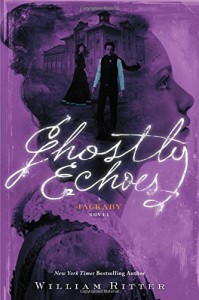Ghostly Echoes

Reading “Ghostly Echoes” could be captured best, I think, using the metaphor of the teenager. The book is at the part in the series where the initial giddiness and adrenaline of the first book has worn off, and the tougher questions and plot nuances begin coming to light. Unlike it’s immediate predecessor, “Ghostly Echoes” is much tidier with its loose ends — the holes in the plot are no longer as daunting as Jackaby begins giving readers some answers, particularly when it comes to Jenny and how she is connected with the entire case that has begun with the seemingly unrelated first adventure that Abigail and Jackaby embark upon in the beginning of the series.
The book has clearly shown signs of growth, the most notable of which was the character of Lydia Lee. When it comes to playing a part in the plot itself, Lydia had quite an important task which, nonetheless, fell under the traditional archetype of the character who appears with a solution just in the nick of time. Yet that would be saying nothing of her true value, which was to open up the discussion of gender identity and inclusivity. It wasn’t completely necessary to include in the book — most would avoid the topic entirely, as it is something that historians are only beginning to learn about, discovering how such topics were addressed in the past. But Ritter didn’t shy away from it, and it made me so incredibly happy to see this part of Jackaby, the moral side that shows aspects of compassion mixed in. It was similar to how Sherlock would show occasional glimmers of humanity throughout the series, though here, it somehow felt even more powerful, perhaps because of the way in which the moment when Jackaby says doctors cannot tell us who we are spoke on both the real and the mythical levels.
When it comes to the humour aspect of the book, elements of that are present as well. The scene with Chiron and Abigail made me laugh at a couple points because of that, though overall I do think the overall level of entertainment in that regard has remained stable for the third book in a row. I do wish there was more of Charlie however, and I think his relations with Abigail were a bit stilted. It only makes me hope for a more well-paced final fourth installment, as opposed to a rushed ending in which everything that wasn’t included in this one finding its way into the final book. Jackaby, as mentioned, has become more human and balanced as well, revealing more details of his past as well as showing an admirable bond with Jenny in his willingness and persistence to find out what had happened to her. And Jenny herself proved a remarkable character who was surprisingly incredibly easy to relate to. Many a wallflower will find the scene with her, Jackaby, and the brick rather powerful as an indirect source of motivation.
Just like a teenager, “Ghostly Echoes” has its ups and downs. It’s by no means perfect, nor was in able to create the same kind of amazement in me that I felt when I read “Jackaby”. However, I am now beginning to suspect that that is simply a matter of novelty, as the beginning of the series was a quirky wonder that I hadn’t come across before. Now that I am more familiar with the cast of characters, it is much easier to be analytical and balanced in terms of criticism, though the characters have remained the driving force of the books. It is best to look at “Ghostly Echoes”, then, as a much stronger extension of “Beastly Bones”, in the sense that it fulfills the same function as a “filler” component to the series, being much more driven by the questions and answers that will ultimately propel the plot to its grand finale, one which I look forward to with much enthusiasm and hope, having found myself quite attached to this lovable cast of characters that continue to give me some hope for the future of the YA genre.
 2
2





